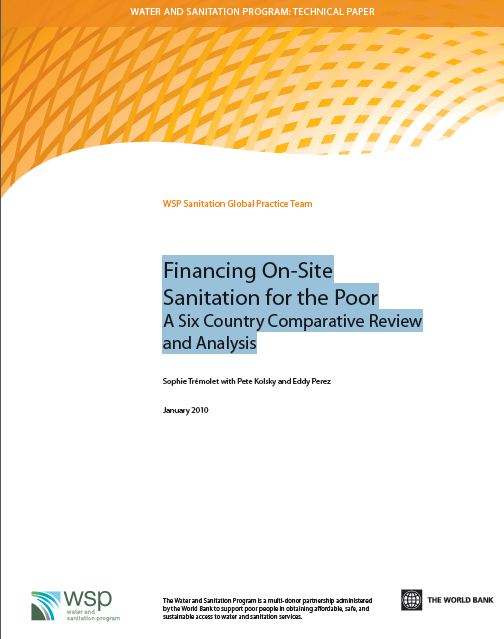Financing On-Site Sanitation for the Poor A Six Country Comparative Review and Analysis
 |
rapport Jan 2010 ; 172 pages
Aut. Sophie Trémolet & Pete Kolsky &
Ed. WSP - Washington World Bank - Washington
Téléchargeable sous format: PdF
Téléchargeable chez l'éditeur
Page de présentation d'un éditeur
Abstract:
The present study offers evidence on alternative financing approaches for on-site household sanitation from case studies in six countries: Bangladesh, Ecuador, India, Mozambique, Senegal, and Vietnam. This evidence can help identify the best-performing approaches and the relevant factors and issues to consider in designing a sanitation financing strategy. The study systematically compares alternative financing approaches based on a set of common indicators, including in terms of the effectiveness in the use of public funds and targeting. The team chose to focus on those projects recognized as successes to obtain a reasonable representation of the better practices in sanitation programs. The study identified a number of useful examples and tentative lessons about finance which should help to advance the design of sanitation finance at the outset of a project. Replicating such experiences will require a better understanding of what drives household investment and what the key constraints limiting such investment are, in both financial and non-financial terms. The sanitation challenge continues to grow with population, as does the cost of failing to meet it. This study is a worthwhile contribution to addressing the challenge of how to pay for sanitation.
Mots clefs: |
assainissement autonome (CI) (DT) (OP) (ope) , population à faible revenus (CI) (DT) (OP) (ope) |
Editeurs/Diffuseurs: |
|
WSP
-
Water and Sanitation Program - Washington - Etats Unis |
World Bank - Washington - Etats Unis |
En cas de lien brisé, nous le mentionner à communication@pseau.org